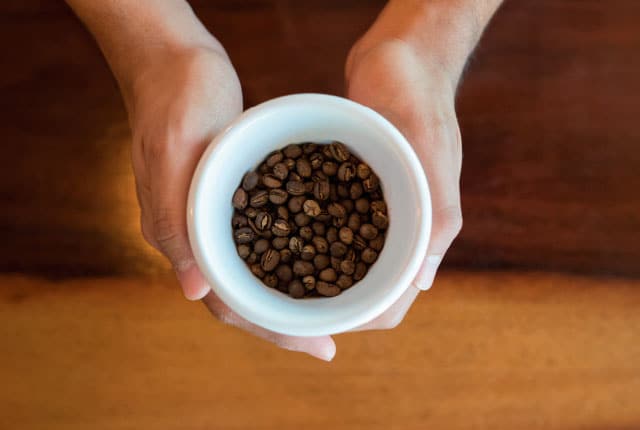
Coffee tastes best when it’s fresh. So, how can you take the measures at home to ensure your coffee stays that way?
There are many tips and tricks out there, but some will do more harm than good. Read on to discover why we need to store coffee properly, how you can do this at home, and top tips for getting the best out of your coffee.
Credit: Jean Pierre Flores
Why Is Coffee Storage Important?
Potatoes go in dark, dry cupboards and cheese goes in the fridge. There are many well-known rules which surround how to keep household favourite foods fresh.
This is exactly the same for our favourite morning beverage, coffee. If it’s not stored correctly, it will not be at its best. Daniel Hobart, World Cup Tasters Champion 2019, based in Ireland says, “Coffee… does go out of date, but doesn’t mean that you’re going to get sick.”
Although this is great news, old coffee won’t be the best thing to use. Coffee is a food, and as with all foods, it reacts with oxygen and becomes stale over time. Daniel tells me, “It’s going to lose the freshness, flavour, and aromas.”
The flavours and aromas are what makes coffee delicious. So, when these dwindle because of exposure to oxygen, you will get a less vibrant and flavourful cup. However, when stored correctly, you can help protect the freshness of coffee, and keep it tasting better for longer.
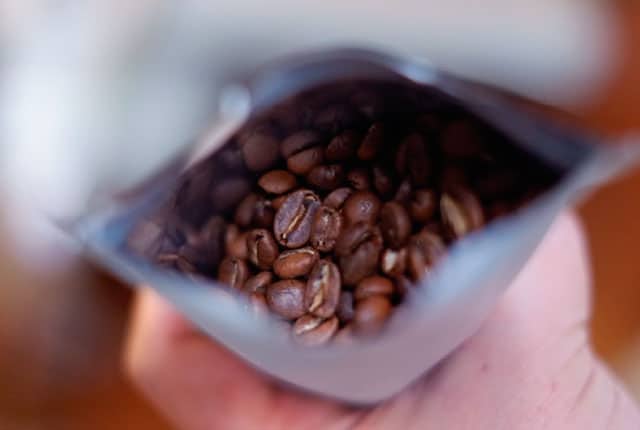
Credit: Neil Soque
How To Store Coffee at Home
We’ve compiled all the steps to ensuring you’re storing your coffee the best possible way at home.
1. Check The Roast Date
You wouldn’t buy out of date food, so, make sure you’re checking the roast date of your coffee. This is the first step in keeping your coffee fresher at home.
Daniel tells me, “It’s highly recommended to get coffee as fresh as possible.” Coffee loses its flavours and aromas over time, so you’ll have a better chance of brewing a great cup of coffee with fresher beans.
Daniel says, “But try to keep in mind that coffee needs to degas as well, so you will need to leave it from four to seven days after roasting to degas.” During the roasting process, different gases form inside the bean, including carbon dioxide. This carbon dioxide continues to be released from the bean after roasting, a process called degassing.
If you’re brewing a filter coffee, you will be able to use your coffee a few days after the roast date. If you’re brewing an espresso, it’s recommended to wait at least seven days. If not, the gases in the bean can impede the water and interrupt the extraction, resulting in a stale and flat taste.
So, until when should you drink your coffee? Daniel tells me, “coffee should be good to consume up to one month after roasting”. This doesn’t mean you can’t drink the coffee after one month from the roast date. It’s just not recommended if you want to get the best flavour from the coffee.
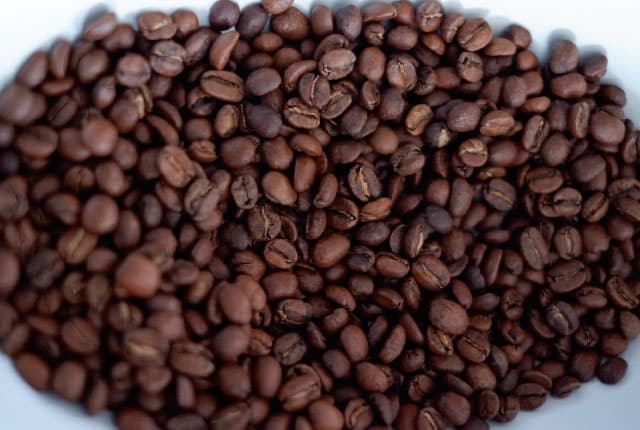
Credit: Neil Soque
2. Reduce Contact With Oxygen
Contact with the air, specifically with oxygen, will make coffee stale quicker. So, reducing that contact is an easy way to improve how you store your coffee at home.
How can you do this from home? Nisan Ağca, Turkey Barista Champion 2016, 2017, 2019, based in Turkey, tells me, “I usually keep my coffees in their original package if it has a ziplock. Otherwise, I will change it for another package.”
A ziplock will help prevent oxygen from entering the bag. If you’re keeping coffee in the original bag with a ziplock or transferring it to a different bag, try to push out as much air from the bag as possible before you close it. This way, there is less remaining air in the bag to react with the coffee.
Daniel also suggests vacuum packing coffee using a vacuum pack machine. These completely remove the air from the bag, leaving little to no air inside. Similarly, vacuum jars can be bought online, which involve filling the jar with coffee, screwing on the lid, and using a button to remove the air inside. Just remember that coffee should be stored in opaque containers, so no sunlight reacts with the bean.
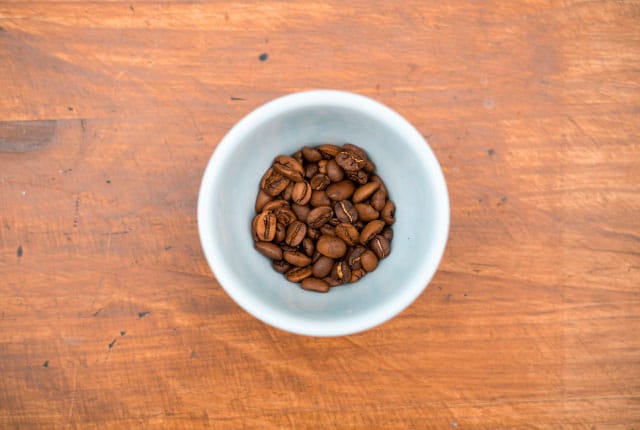
Coffee beans in a cup. Credit: Jean Pierre Flores
3. Store Your Coffee in The Right Place
Moisture, light, and heat all contribute towards making coffee stale. So, coffee needs to be stored in a cool, dry, and dark place.
This could be a cupboard or a pantry if you have one. Be mindful that this space should ideally be away from a heat source, such as an oven.
Nisan tells me, “I keep coffee away from spices or anything that smells because coffee is so powerful when it comes to absorbing aromas.” Coffee is hygroscopic, meaning it absorbs everything in its environment, including oxygen, aromas, and moisture. It’s best to keep it away from any foods with strong smells, or out of an environment with a lot of odours.
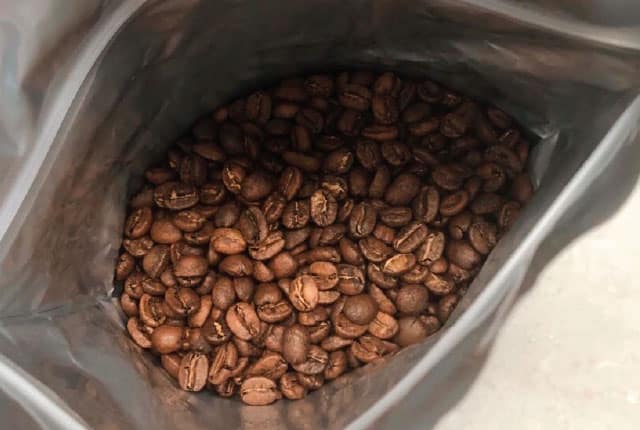
Credit: Ana Valencia
4. Buy Less Coffee & Grind It Yourself
When buying your coffee, there are things you can do which will enhance your storage of coffee at home, and in turn, its freshness.
Enhancing the storage of your coffee can also be done according to what kind of coffee you buy and how much you’re buying.
Whole beans keep better than pre-ground coffee, which goes stale much quicker. Grinding increases the beans’ surface area, which then speeds up the rate that oxygen reacts with it. Daniel says, “If you want to preserve the coffee as long as possible, you should buy whole bean and grind it fresh.”
Buying larger bags of coffee also means that fresh coffee goes without being used for longer, which can result in stale coffee. Eric Squires, who used to manage Three Crowns Coffee in Indiana, tells me, “Keep only small amounts on hand, about what you consume in a week.”
If it’s not possible to get smaller bags more regularly, it’s best to stick to the rules of keeping coffee in cool, dry, and dark places, and grinding it yourself if possible.
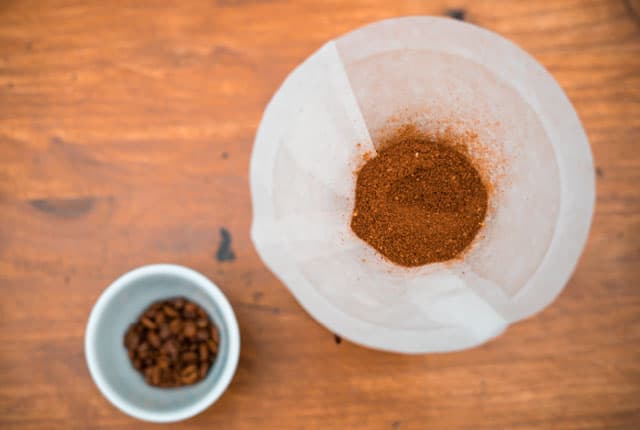
Credit: Jean Pierre Flores
Storing Coffee Myths: Debunked
You might see different tips and tricks being shared about how to keep coffee fresh – but not all of them are entirely true. We’ve debunked a few myths about storing coffee, so you can be confident your coffee really is as fresh as possible
Keeping Coffee in The Fridge:
Coffee is porous and will absorb aromas and odours. The fridge is full of different smells from the varying foods which are stored inside. Eric tells me that “storing it in the fridge will make coffee act like baking soda”, in that it will absorb the surrounding smells.
There is also a lot of moisture in the fridge, which will contribute to coffee becoming stale quicker, as the bean reacts with the moisture.
Keeping Coffee in The Freezer
Daniel explains that you can keep coffee in the freezer. However, he says, “It’s very important to vacuum bag the coffee and then freeze it. Don’t leave air in contact with coffees” as this results in coffee absorbing odours and moisture.
Coffee should not be put directly into the freezer for storage. If you don’t remove the air from inside the bag, the coffee is at risk of absorbing the high moisture content and potential smells from inside the freezer.
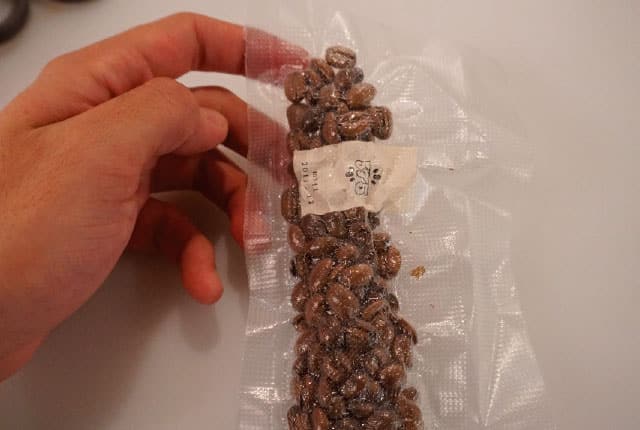
Credit: Julio Guevara
Storing coffee at home can be simple and effective, and when done right, it will mean you get the best out of the coffee that you buy. It’s important to remember that coffee is a food and to treat it as you would your other groceries, ensuring it stays fresh and can be enjoyed to its full extent.
Give it a go yourself and see whether improving your coffee storage makes a difference with your daily brew.
Written by Helena Brown.
Original Post Perfect Daily grind : https://www.perfectdailygrind.com/2020/04/how-to-store-coffee-at-home/
